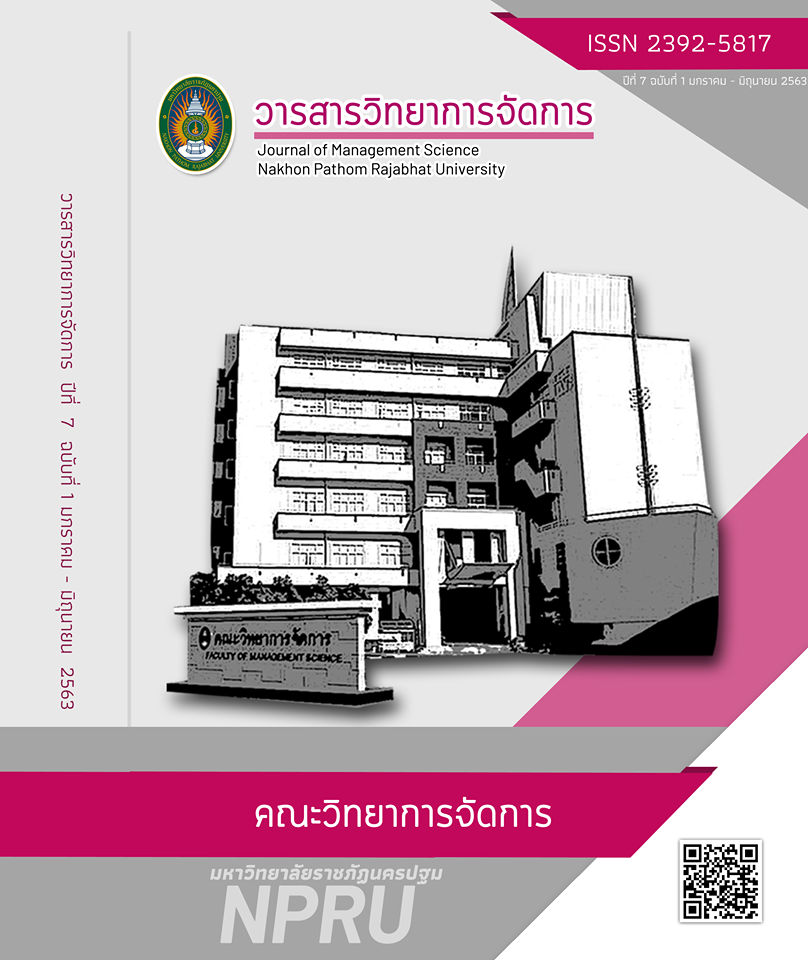Success of the Project Administration to Enhance the Village Potential According to the Civil State Policy.
Main Article Content
Abstract
The objectives of this study were threefold: 1) to compare the effectiveness of enhancing the village potential according to the Civil State policy; 2) to compare the problem and obstacles springing from the project administration concerning the enhancement of the village potential to drive the fundamental economy according to the Civil State policy; and 3) to seek guidelines for use in streamlining the project administration.
The study was qualitative in character. 60 key informants comprised the sample of the study. They included the following persons: deputy chiefs of district offices, “kamnan” or village headman, and some villagers of high caliber. The collected data were analyzed by using the content analysis.
The data analysis has shell light on the following facts: driving the fundamental economy brought about the people’s participation in solving the villages’ problems, in sharing ideas, in working together to craft various projects; all activities were supervised by community leader or official leaders; the leaders played a dominant part in making recommendations, creating new ideas, providing useful data for use in decision making, as well as creating volunteering – mind. In addition, people or government officials directly responsible for the projects would make final decisions in carrying out the most useful projects after they had exchanged views and ideas with the villagers and all stakeholders. It was noteworthy that community members or villagers were highly prepared for the operation of various projects according to the Civil State policy despite the time constraints; they expedited currying out all the projects until completion notably the projects that had been planned in advance. Furthermore, the community members or villagers were fully prepared for forming groups in a voluntary fashion. By so doing, they were in a better position to express their views and ideas about the policies and projects that were most likely to be of great benefit to their localities.
Article history : Received 3 June 2019
Revised 16 June 2019
Accepted 18 June 2019
SIMILARITY INDEX = 0.00 %
Article Details
The views and opinions of the article appearing in this journal are those of the author. It is not considered a view and responsibility of the editorial staff.
References
ชาญชัย จิตรเหล่าอาพร.(2551) ทุนทางสังคม (social capital) : การรับมือกับการเปลี่ยนแปลงทางการเมืองและเศรษฐกิจ กรณีศึกษา อ.เมือง และ อ.กันทรวิชัย จ.มหาสารคาม.กรุงเทพมหานคร : สำนักงานคณะกรรมการวิจัยแห่งชาติ.
ทศพร ศิริสัมพันธ์. (2553). โครงการสานพลังประชารัฐ. [ออนไลน์]. ค้นเมื่อ 15 ธันวาคม 2561,จาก http://www.สานพลังประชารัฐ.com/committee/.
พัชรินทร์ วรดิถี. (2559). สานพลังประชารัฐ: การพัฒนาเศรษฐกิจฐานรากและประชารัฐ. กรุงเทพมหานคร:กองวิชาการกรมพัฒนาสังคมและสวัสดิการ กระทรวงพัฒนาสังคมและความมั่นคงของมนุษย์.
ศิรินันท์ ทิพย์เจริญ (2555) ธรรมาภิบาลกับการบริหารจัดการภาครัฐแนวใหม่ ในองค์กรปกครองส่วนท้องถิ่นไทย.วารสารสหวิทยาการวิจัย. 1 (2), 97-103.
สำนักนายกรัฐมนตรี. (2559). นโยบายและแนวทางการดำเนินงานสานพลังประชารัฐเพื่อขับเคลื่อนการพัฒนา เศรษฐกิจฐานรากและประชารัฐในระดับพื้นที่. [ออนไลน์]. ค้นเมื่อ 24 กันยายน 2560, จาก http://www. thaigov.go.th/index.php/th/government-th1/item/102750-102750
สำนักงานประสานงานการพัฒนาเศรษฐกิจฐานรากและประชารัฐ. (2559). คู่มือประชารัฐรักสามัคคี ฉบับที่ 2. [ออนไลน์]. ค้นเมื่อ 25 กันยายน 2560, จาก http://www.prsthailand.com/wp-content/ uploads/2016/07/Manual_V2.pdf
เสาวลักษณ์ สุขวิรัช (2549). ทางสองแพร่งของจริยธรรมการบริหาร (The Dilemma of Administrative Zeitgeists). เอกสารการประชุมวิชาการรัฐศาสตร์และรัฐประศาสนศาสตร์แห่งชาติ ครั้งที่ 7 : 643-662.
อรพินท์ สพโชคชัย. (2550).การสร้างการมีส่วนร่วมของประชาชนในการพัฒนาชุมชน. กรุงเทพมหานคร: มูลนิธิสถาบันวิจัยเพื่อการพัฒนาประเทศไทย.
Burns, J. M. (1978). Leadership. New York: Harper and Row
Northouse, P. G. (2004). Leadership: Theory and practice. (3rd ed.). Thousand Oaks, CA: Sage.
Yukl, Gary A. (1994). Leadership in Organization. New Jersey: Prentice - Hall.


